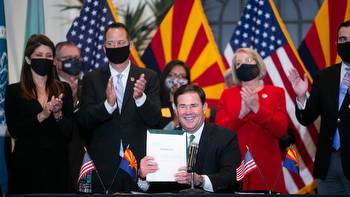Hofmeister backed by tribes, casinos


Hofmeister backed by tribes, casinos
Individuals and entities associated with two groups substantially intertwined in Oklahoma—tribal governments and casinos—represented a significant share of donations to the Democratic gubernatorial campaign of Joy Hofmeister in the fourth quarter of 2021, according to a report filed with the Oklahoma Ethics Commission.
Hofmeister received around 30 donations from tribal governments, tribal government officials, and casino-gaming officials during the fourth quarter. Those donations provided more than $47,000 combined.
During the fourth quarter of 2021, the first in which Hofmeister was a gubernatorial candidate, she reported raising $538,134 from individuals. During that same period, incumbent Gov. Kevin Stitt raised $1.19 million.
Currently the state superintendent of public instruction, Hofmeister announced in October 2021 that she was switching parties to seek the Democratic nomination for governor.
Hofmeister received direct contributions of $2,900 apiece from three tribal governments: the Choctaw Nation, Chickasaw Nation, and Osage Nation.
She also received contributions from a range of individuals whose listed occupations involved working for tribal entities or serving in tribal offices, including Chickasaw Nation Gov. Bill Anoatubby; Potawatomi Nation Tribal Chairman John Barrett; Janees Taylor, treasurer for the Cherokee Nation; Katie Akerman, special assistant to the Chickasaw Nation; Kara Berst, Chickasaw Nation executive; Linda Capps, an elected official with the Potawatomi Nation; Kalyn Free, an attorney who served as former Cherokee Nation Principal Chief Bill John Baker’s general counsel and represented Cherokee Nation Businesses; Debra Gee, deputy attorney general for the Chickasaw Nation; Jennifer Gray, government relations for the Choctaw Nation; Todd Hembree, lawyer for the Cherokee Nation; Danny Hilliard, president of corporate development for the Chickasaw Nation; Frank S. Johnson, Jr., executive leadership with Chickasaw Nation Commerce; Louden Johnson, project manager for the Chickasaw Nation; Jennifer Kaneshiro, human resources for the Chickasaw Nation; Jonna Kirschner, attorney for the Chickasaw Nation; Billy Lance, secretary of commerce for the Chickasaw Nation; Bryeson Lance, gaming intern for the Chickasaw Nation; Kendall Lance, gaming, Chickasaw Nation; Debra Proctor, director of Cherokee Health Services; Brian Rogers, security architect for Cherokee Nation Business; and Randy Wesley, executive officer with the Chickasaw Lighthorse Police.
Under state-tribal compacts, tribal governments have been given monopoly rights to casino gambling in Oklahoma with only a few specified exceptions, leading to substantial interplay between the two groups.
Hofmeister reported receiving contributions from Melton Adair, gaming industry consultant; Ward Chilton, developer with Gaming Capitol [spelling as appears on report] Group; Sean Cowan, a sales employee of American Gaming Systems; Sherri Jo Lance, managing partner and president of Gaming Capitol [spelling as appears on report] Group; Trent Roberts, chief financial officer for Gaming Capitol [spelling as appears on report] Solutions; and Ken Stonecipher, director of construction for Global Gaming Solutions.
Hofmeister is receiving contributions from individuals with tribal-government ties as two major tribes are in a dispute with Gov. Kevin Stitt regarding their alleged failure to abide by state-tribal compacts for hunting and fishing licenses.
As part of those agreements, the state of Oklahoma sold steeply discounted hunting and fishing licenses to the Cherokee and Choctaw nations, charging the tribes just $2 per combined hunting-fishing license for Cherokee and Choctaw citizens, compared to $42 for most other adults. In exchange, the tribes agreed to purchase a set number of licenses each year. The Cherokee Nation agreed to purchase 150,000 licenses per year while the Choctaw Nation agreed to purchase 50,000 per year. The state benefit came from increased federal funding that is tied, in part, to the number of licenses sold annually.
However, Stitt has noted both tribes failed to live up to their obligations and never purchased the minimum number of licenses promised in the compact.
The Cherokee Nation fell an estimated 284,708 cumulative licenses short, costing the state of Oklahoma more than $12.3 million.
The Choctaw Nation fell 152,967 cumulative licenses short, costing the state of Oklahoma more than $5.1 million.
At the same time, Stitt is also fighting in court to restrict the impact of the U.S. Supreme Court’s ruling in McGirt v. Oklahoma, which held that the Muscogee (Creek) Nation’s reservation was never formally disestablished for purposes of the federal Major Crimes Act. As a result, whenever a crime involves a mix of Indian and non-Indian criminals and victims, neither state nor tribal officials can prosecute most of those crimes and those crimes are instead handled by federal law enforcement officials. State law enforcement report the vast majority of cases shifted to the federal government go unprosecuted.
The ruling has since been expanded to include the reservations of the Choctaw, Chickasaw, Cherokee, Seminole, and Quapaw, meaning the restrictions on law-enforcement authority now cover nearly half of Oklahoma.
Tribal officials have repeatedly declined to engage with Stitt regarding McGirt problems, even though many of the crime victims most harmed by McGirt are tribal citizens.
Stitt also previously argued that state-tribal gaming compacts should be renegotiated, noting the rates paid by Oklahoma tribes—4 percent to 6 percent on slot machines—are far below the rates in other states. Tribal officials rejected those efforts and ultimately prevailed in court. That fight occurred even as many Oklahoma tribes were seeking to enter other state markets where they will pay much higher rates, often between 20 percent and 50 percent.
Ray Carter
Director, Center for Independent Journalism
Ray Carter is the director of OCPA’s Center for Independent Journalism. He has two decades of experience in journalism and communications. He previously served as senior Capitol reporter for The Journal Record, media director for the Oklahoma House of Representatives, and chief editorial writer at The Oklahoman. As a reporter for The Journal Record, Carter received 12 Carl Rogan Awards in four years—including awards for investigative reporting, general news reporting, feature writing, spot news reporting, business reporting, and sports reporting. While at The Oklahoman, he was the recipient of several awards, including first place in the editorial writing category of the Associated Press/Oklahoma News Executives Carl Rogan Memorial News Excellence Competition for an editorial on the history of racism in the Oklahoma legislature.

























